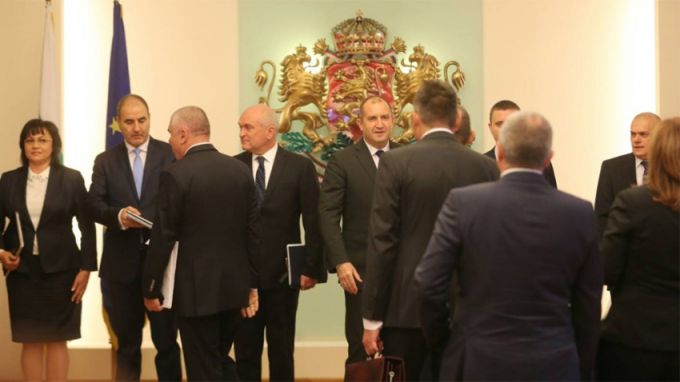
On Monday the Bulgarian citizens witnessed an unprecedented failure of the sitting of the Consultative Council on National Security convened by Bulgaria’s President Rumen Radev. The National Security Consultative Council does not take mandatory decisions, but it is important, because the main factors in Bulgaria’s political life, which attend the event, cohere there general guides to action on topics of top priority. The task of the participants on Monday’s sitting of the Consultative Council on National Security was to mark out legislative measures in the fight against corruption.
The competent institutions in charge of the fight against corruption presented their reports at the Consultative Council on National Security, but the participants did not reach a common position and Bulgaria’s head of state Radev closed the sitting due to a lack of quorum. Bulgaria’s Premier Boyko Borissov was late for the sitting, because he met with employees who were at that time protesting downtown Sofia. No Deputy Premiers attended the sitting of the Consultative Council on National Security and some of the participants left the sitting earlier to take part at various initiatives and events. The Bulgarian Socialist Party accused the ruling coalition of boycotting the sitting of the Consultative Council on National Security. However, those who left the sitting earlier excused themselves with “official engagements”. Bulgaria’s President Radev, who had convened the Consultative Council on National Security on August 30, summoned another sitting to take place on October 17 and commented that the country will make a breakthrough in the fight against corruption when this problem becomes a top priority in the politicians’ agenda.
Confrontation between the ruling coalition and the President was expected, because several days before the sitting of the Consultative Council on National Security GERB accused indirectly Bulgaria’s head of state in corruption and Rumen Radev said in return that GERB was in a battle against him and that they will have that battle if they want it. However, representatives of the Movement for Rights and Freedoms and Volya party also left the sitting of the Consultative Council on National Security earlier. This causes perplexity and doubts of a lack of will to solve that problem, because Bulgaria has been subject to systematic criticism by the EU for years. This move also causes bewilderment, because it happens in a moment when Sofia calls on the European Commission to remove the monitoring mechanism on the country’s progress in justice and home affairs fields and insists that it should become a Schengen member. This causes bewilderment, because the episode of sharp political confrontation occurs in a moment when all political parties represented at the National Assembly say the political elite should consolidate before Bulgaria’s rotating Presidency of the Council of the European Union which starts in less than three months. Soon after the failure of the Consultative Council on National Security the Bulgarian cabinet published a statement reading that all allegations about boycott of the sitting were speculation. The cabinet fully supports the efforts of the Bulgarian President to consolidate the institutions in the fight against corruption and will continue to participate actively in this process, the statement further reads.
Bulgaria’s government also assures that its priority is to fight systematically corruption at all levels and to adopt an anti-corruption law by the end of 2017. The Bulgarian society now awaits the second sitting of the Consultative Council on National Security on October 17.
English version: Kostadin Atanasov
Romania closes dozens of border check points as of 1 January In connection with its full accession to the Schengen area, as of 1 January, 2025, Romania is closing more than 30 border check points on its borders with Bulgaria and Hungary, Radio..
From the distance of time, history and researchers will give their assessment of Bulgaria and its neighbourly relations in the first quarter of the 21st century. But even then, they will rely on the facts and perceptions of contemporaries about them...
Albania and Montenegro mark progress in European integration in 2024 EU leaders met on December 18 with their counterparts from the Western Balkans. European Commission President Ursula von der Leyen called for finding..

+359 2 9336 661
